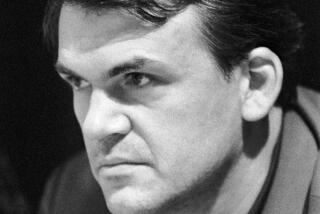The Writing Life: The point of the long and winding sentence
- Share via
“Your sentences are so long,” said a friend who teaches English at a local college, and I could tell she didn’t quite mean it as a compliment. The copy editor who painstakingly went through my most recent book often put yellow dashes on-screen around my multiplying clauses, to ask if I didn’t want to break up my sentences or put less material in every one. Both responses couldn’t have been kinder or more considered, but what my friend and my colleague may not have sensed was this: I’m using longer and longer sentences as a small protest against — and attempt to rescue any readers I might have from — the bombardment of the moment.
When I began writing for a living, my feeling was that my job was to give the reader something vivid, quick and concrete that she couldn’t get in any other form; a writer was an information-gathering machine, I thought, and especially as a journalist, my job was to go out into the world and gather details, moments, impressions as visual and immediate as TV. Facts were what we needed most. And if you watched the world closely enough, I believed (and still do), you could begin to see what it would do next, just as you can with a sibling or a friend; Don DeLillo or Salman Rushdie aren’t mystics, but they can tell us what the world is going to do tomorrow because they follow it so attentively.
Yet nowadays the planet is moving too fast for even a Rushdie or DeLillo to keep up, and many of us in the privileged world have access to more information than we know what to do with. What we crave is something that will free us from the overcrowded moment and allow us to see it in a larger light. No writer can compete, for speed and urgency, with texts or CNN news flashes or RSS feeds, but any writer can try to give us the depth, the nuances — the “gaps,” as Annie Dillard calls them — that don’t show up on many screens. Not everyone wants to be reduced to a sound bite or a bumper sticker.
Enter (I hope) the long sentence: the collection of clauses that is so many-chambered and lavish and abundant in tones and suggestions, that has so much room for near-contradiction and ambiguity and those places in memory or imagination that can’t be simplified, or put into easy words, that it allows the reader to keep many things in her head and heart at the same time, and to descend, as by a spiral staircase, deeper into herself and those things that won’t be squeezed into an either/or. With each clause, we’re taken further and further from trite conclusions — or that at least is the hope — and away from reductionism, as if the writer were a dentist, saying “Open wider” so that he can probe the tender, neglected spaces in the reader (though in this case it’s not the mouth that he’s attending to but the mind).
“There was a little stoop of humility,” Alan Hollinghurst writes in a sentence I’ve chosen almost at random from his recent novel “The Stranger’s Child,” “as she passed through the door, into the larger but darker library beyond, a hint of frailty, an affectation of bearing more than her fifty-nine years, a slight bewildered totter among the grandeur that her daughter now had to pretend to take for granted.” You may notice — though you don’t have to — that “humility” has rather quickly elided into “affectation,” and the point of view has shifted by the end of the sentence, and the physical movement through the rooms accompanies a gradual inner movement that progresses through four parallel clauses, each of which, though legato, suggests a slightly different take on things.
Many a reader will have no time for this; William Gass or Sir Thomas Browne may seem long-winded, the equivalent of driving from L.A. to San Francisco by way of Death Valley, Tijuana and the Sierras. And a highly skilled writer, a Hemingway or James Salter, can get plenty of shading and suggestion into even the shortest and straightest of sentences. But too often nowadays our writing is telegraphic as a way of keeping our thinking simplistic, our feeling slogan-crude. The short sentence is the domain of uninflected talk-radio rants and shouting heads on TV who feel that qualification or subtlety is an assault on their integrity (and not, as it truly is, integrity’s greatest adornment).
If we continue along this road, whole areas of feeling and cognition and experience will be lost to us. We will not be able to read one another very well if we can’t read Proust’s labyrinthine sentences, admitting us to those half-lighted realms where memory blurs into imagination, and we hide from the person we care for or punish the thing that we love. And how can we feel the layers, the sprawl, the many-sidedness of Istanbul in all its crowding amplitude without the 700-word sentence, transcribing its features, that Orhan Pamuk offered in tribute to his lifelong love?
To pick up a book is, ideally, to enter a world of intimacy and continuity; the best volumes usher us into a larger universe, a more spacious state of mind akin to the one I feel when hearing Bach (or Sigur Rós) or watching a Terrence Malick film. I cherish Thomas Pynchon’s prose (in “Mason & Dixon,” say), not just because it’s beautiful, but because his long, impeccable sentences take me, with each clause, further from the normal and the predictable, and deeper into dimensions I hadn’t dared to contemplate. I can’t get enough of Philip Roth because the energy and the complication of his sentences, at his best, pull me into a furious debate in which I see a mind alive, self-questioning, wildly controlled in its engagement with the world. His is a prose that banishes all simplicities while never letting go of passion.
Not every fashioner of many-comma’d sentences works for every one of us — I happen to find Henry James unreadable, his fussily unfolding clauses less a reflection of his noticing everything than of his inability to make up his mind or bring anything to closure: a kind of mental stutter. But the promise of the long sentence is that it will take you beyond the known, far from shore, into depths and mysteries you can’t get your mind, or most of your words, around.
When I read the great exemplar of this, Herman Melville — and when I feel the building tension as Martin Luther King’s “Letter from Birmingham Jail” swells with clause after biblical clause of all the things people of his skin color cannot do — I feel as if I’m stepping out of the crowded, overlighted fluorescent culture of my local convenience store and being taken up to a very high place from which I can see across time and space, in myself and in the world. It’s as if I’ve been rescued, for a moment, from the jostle and rush of the 405 Freeway and led back to something inside me that has room for certainty and doubt at once.
Watch Dillard light up and rise up and ease down as she finds, near the end of her 1974 book “Pilgrim at Tinker Creek,” “a maple key, a single winged seed from a pair. Hullo. I threw it into the wind and it flew off again, bristling with animate purpose, not like a thing dropped or windblown, pushed by the witless winds of convection currents hauling round the world’s rondure where they must, but like a creature muscled and vigorous, or a creature spread thin to that other wind, the wind of the spirit which bloweth where it listeth, lighting, and raising up, and easing down.”
I love books; I read and write them for the same reason I love to talk with a friend for 10 hours, not 10 minutes (let alone, as is the case with the average Web page, 10 seconds). The longer our talk goes, ideally, the less I feel pushed and bullied into the unbreathing boxes of black and white, Republican or Democrat, us or them. The long sentence is how we begin to free ourselves from the machine-like world of bullet points and the inhumanity of ballot-box yeas or nays.
There’ll always be a place for the short sentence, and no one could thrill more than I to the eerie incantations of DeLillo, building up menace with each reiterated note, or the compressed wisdom of a Wilde; it’s the elegant conciseness of their phrases that allow us to carry around the ideas of an Emerson (or Lao Tzu) as if they were commandments or proverbs of universal application.
But we’ve got shortness and speed up the wazoo these days; what I long for is something that will sustain me and stretch me till something snaps, take me so far beyond a simple clause or a single formulation that suddenly, unexpectedly, I find myself in a place that feels as spacious and strange as life itself.
The long sentence opens the very doors that a short sentence simply slams shut. Though the sentence I sent my copy editor was as short as possible. No.
Iyer is the author, most recently, of “The Man Within My Head,” published this month.
More to Read
Sign up for our Book Club newsletter
Get the latest news, events and more from the Los Angeles Times Book Club, and help us get L.A. reading and talking.
You may occasionally receive promotional content from the Los Angeles Times.










